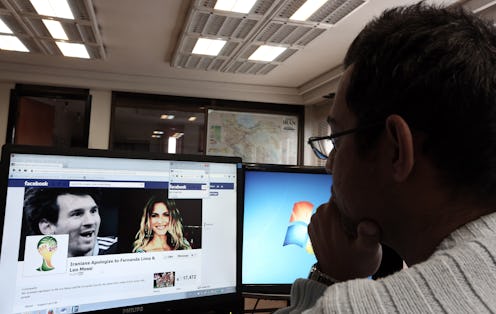Have you ever wondered why you can't stop checking Facebook at work? We've all been in this situation: You've just wrapped up an intensive work assignment, and it occurs to you how proud you'd be of yourself if you were a good employee and went on to the next assignment immediately. Then, just as you're congratulating yourself for merely thinking that thought, you somehow accidentally type an "f" into your browser, which just happens to fill in "facebook.com," you momentarily lose control of your finger joints, causing a spasm in your pinky that presses the "enter" button, and then your friends' statuses are suddenly filling your screens, and, funny, how did this all happen?
According to a recent brain imaging study, there may be a neurological reason for the automaticity that characterizes our Facebook breaks. The state of our brains when we're resting resembles their state when we're looking at photos of people and asked to judge the accuracy of captions about them that, whether the researchers intended it or not, resemble Facebook statuses: “He is feeling bored," for example, or “She is expressing self-doubt.” When people looked at photos with captions simply describing the people's actions or containing unrelated mathematical equations, "resting state" brain activity dropped.
In addition, a region at the front of the brain called the dorsomedial prefrontal cortex occasionally became active when participants' minds were idle between photos, and when it did, they were much quicker at assessing the captions of the photos, as if the brain activation were preparing them for the feat ahead.
Matthew Lieberman, one of the researchers, concludes in a press release, “When I want to take a break from work, the brain network that comes on is the same network we use when we’re looking through our Facebook timeline and seeing what our friends are up to.”
So basically, when your dorsolateral prefrontal cortex (which often correlates with self-control) is like, "Get back to work," your dorsomedial prefrontal cortex is like...
Perhaps another reason Facebook-checking seems like such an unavoidable part of our workdays is that we've grown to associate Facebook with taking a break, the same way cigarette smokers may have a harder time quitting because stepping outside for a cigarette constitutes their relaxation time. In addition to the sheer force of habit, our brain's good old reward circuit could increase Facebook's appeal by giving the social networking site the addition significance of our not-working time.
These scientific phenomena may explain why 70 percent of Facebook users use the site on a daily basis and 29 percent of Americans use Facebook at work every day.
So, next time you're Facebook chatting in one window while you answer work emails in another, don't blame yourself, blame your stupid brain! Except this logic doesn't really work, because you sort of are your brain. Just saying.
Images: Giphy (4)
